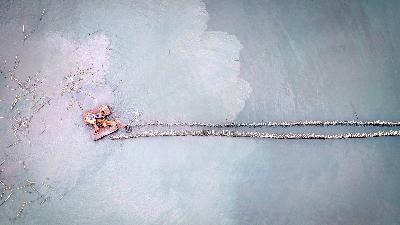The Lifelong Good Example of Pope Francis
Monday, April 28, 2025
Pope Francis left behind a good example of religious leadership. He asked the faithful to strengthen their humanity.
arsip tempo : 174669014494.

POPE Francis left behind a lifelong exemplary legacy. After more than 12 years leading the Vatican, his authority was not only recognized by 1.4 billion Catholics around the world but also by followers of other religions. Throughout his leadership, he always asked religious people to strengthen their faith while preserving humanity and peace.
Pope Francis died on Monday April 21, 2025 at the age of 88 after repeated stays in the hospital. It was as if he did not want to relax. The day before his death, he appeared in public as part of the Easter celebrations in Saint Peter’s Square, the huge plaza in the Vatican. In a religious speech read by one of his colleagues, he included his concern about the suffering of the Palestinian people in the Gaza Strip as a result of the Israeli military invasion. He called for a ceasefire in the region.
After being elected as Pope on March 13, 2013, the Argentinian who was originally named Jorge Mario Bergoglio often spread messages of peace and love to the world. In his first encyclical— an official papal letter—in June 2013 titled Lumen Fidei, or ‘The Light of Faith,’ he wrote that one form of faith that illuminates the world is truth and love. In his encyclical issued as supreme leader of Catholics the following year, Pope Francis included the message that all living creatures are connected and that all humans are brothers.
This view makes Pope Francis a good example to follow. He did not always extoll religious dogma. Catholics, for example, do not recognize same-sex marriage. But he was the first pope to embrace the lesbian, gay, bisexual and transgender community. He even said he was willing to bless its members. His reasoning was truly moving: if a gay person is seeking God with good intention, the Pope has no right to judge him. The explanation he gave is that the Pope is not God.
Pope Francis openly said from the beginning that heaven is not only for Catholics. He said that atheists would also receive a place in heaven as long as they had done good in their lives. He repeated this statement in Rome in 2018 when answering a question from a 10-year-old child who asked if his father would go to heaven even though he had died an atheist. This stance was at odds with many other groups who often claim that heaven is only for their co-religionists.
Pope Francis also often expressed concern about humanitarian and reformist issues. He repeatedly urged the people of the world to fight the evil of human trafficking. He was also willing to eat lunch with refugees and homeless people. And in a break with previous popes, he gave more opportunities for women to play roles in serving the faithful in spiritual guidance and leading retreats.
As a human being, he also had flaws. He was accused of involvement in the 1976 kidnapping of two priests by the military during the Dirty War in Argentina. He was also accused of not speaking out strongly against Cardinal Theodore McCarrick, who was accused of sexual assault. But Pope Francis also openly spoke out against sexual abuse and violence in the church. He fired many priests found guilty of criminal acts and sexual abuses.
He also lived a simple life to the end of his days. Before he died, he even revised the regulations to shorten the papal funeral ceremony, which was previously organized on a grand scale. Pope Francis taught that commitments must be put into practice, not just talked about.











